FAQ: Teacher pay rises 2023

The new teacher pay rise has been headline news - but teachers in schools might be left wondering how it will change the money they see in their bank account each month.
Tes has the answers to the most important questions you could have about pay:
1. I am a classroom teacher, will I receive a pay rise?
Good news - yes, you will.
Teachers paid on the main and upper pay scales will see an increase in their pay of 6.5 per cent, except those moving onto M1 in areas outside of the London weighting area, who will receive an increase of 7.1 per cent, and those on the fringe of London, who will receive a 6.8 per cent rise.
In addition to this, teachers who are expecting to move up a scale point will also see a further increase.
For example, a teacher working in England (outside of the London weighting area), who was paid £31,750 on M3 in 2022-23 will move up the pay scale onto M4 and be paid £36,051. This is an increase of 13.5 per cent.
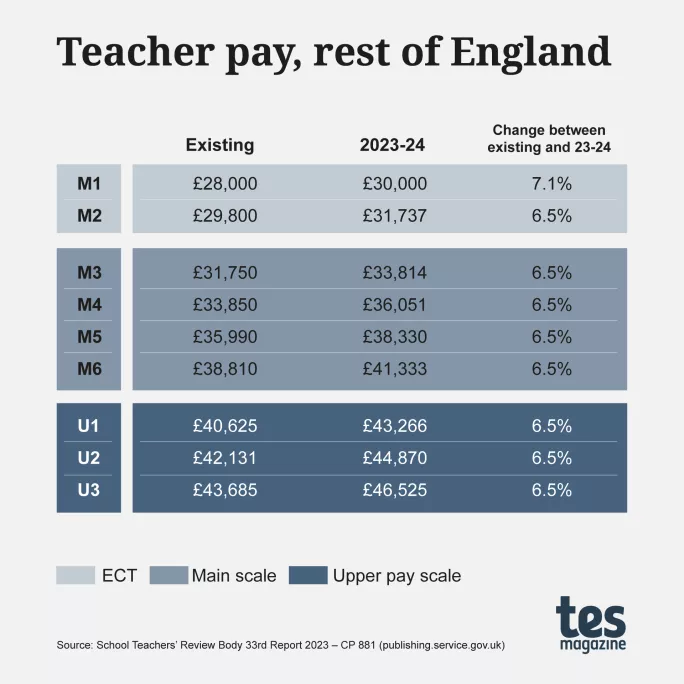
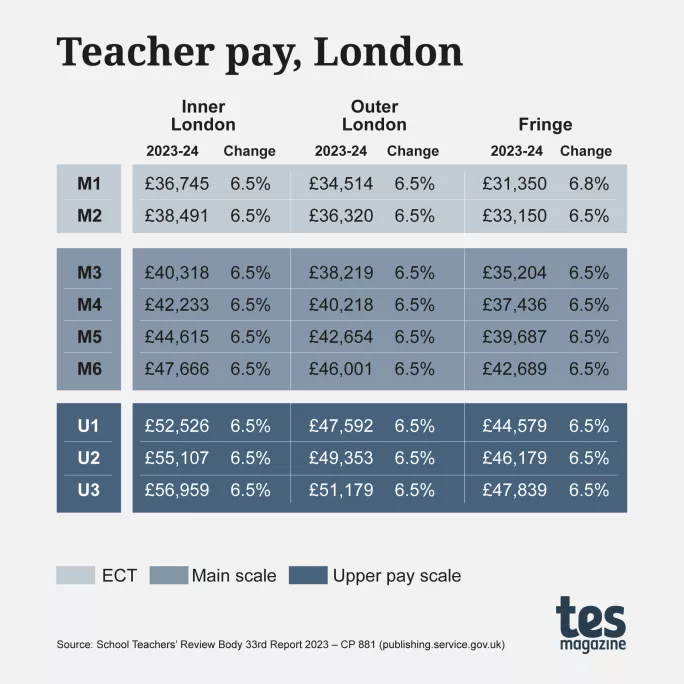
2. I didn’t go on strike, will I still receive the pay rise?
Yes, all teachers regardless of whether they went on strike or are a member of a union will receive the pay rise.
3. I have a Teaching and Learning Responsibility (TLR), will this also increase?
Yes, all TLR payments will also increase by 6.5 per cent. This means that teachers who are paid on the main pay scale with a TLR will see an increase in both their basic pay and their extra TLR payment.
For example, a teacher (working in England and outside of the London weighting area) who is paid on U3 and has a TLR1 for leading their department would have been paid £43,685 plus £8,706, making their salary £52,391.
Following the pay rise, the teacher can expect to see a 6.5 per cent increase on both their main scale pay, and their TLR pay, making their new salary £55,797.
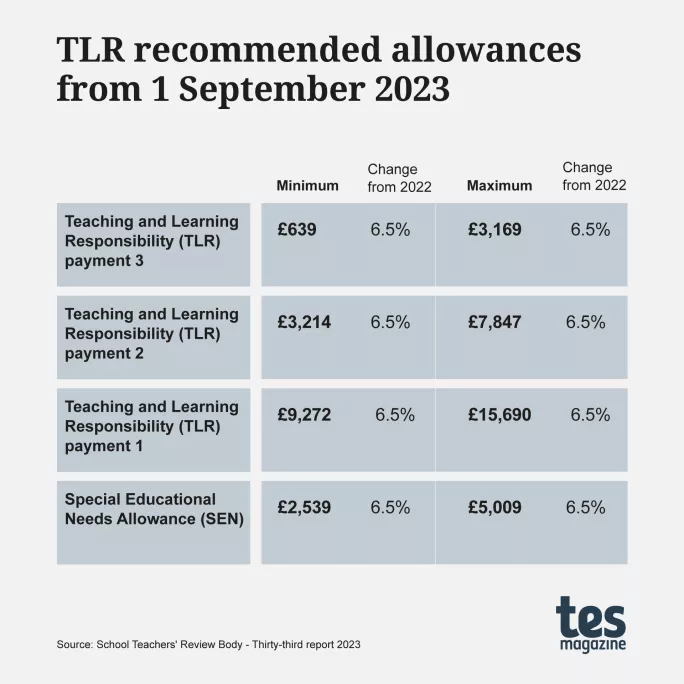
4. I am paid on the leadership scale, is this going to increase?
Yes, the leadership pay scale is increasing by 6.5 per cent, too. Please check the tables below for leadership and headteacher pay.
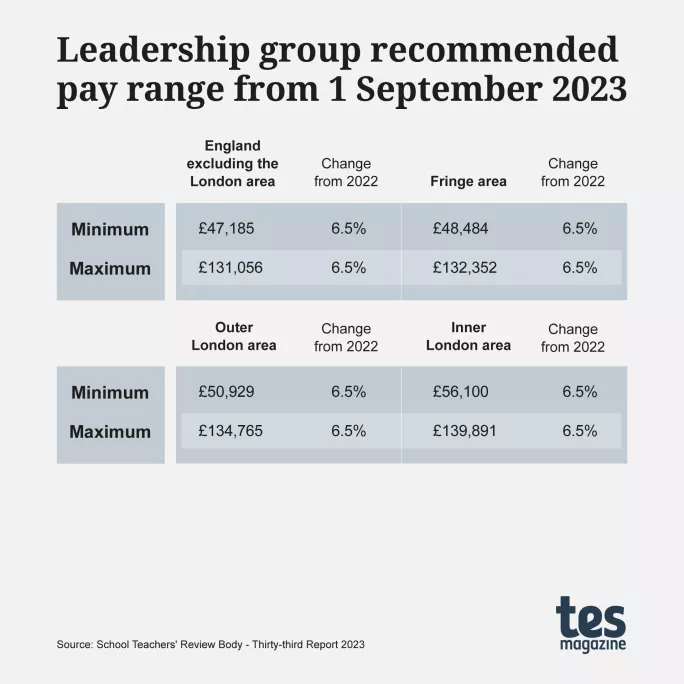
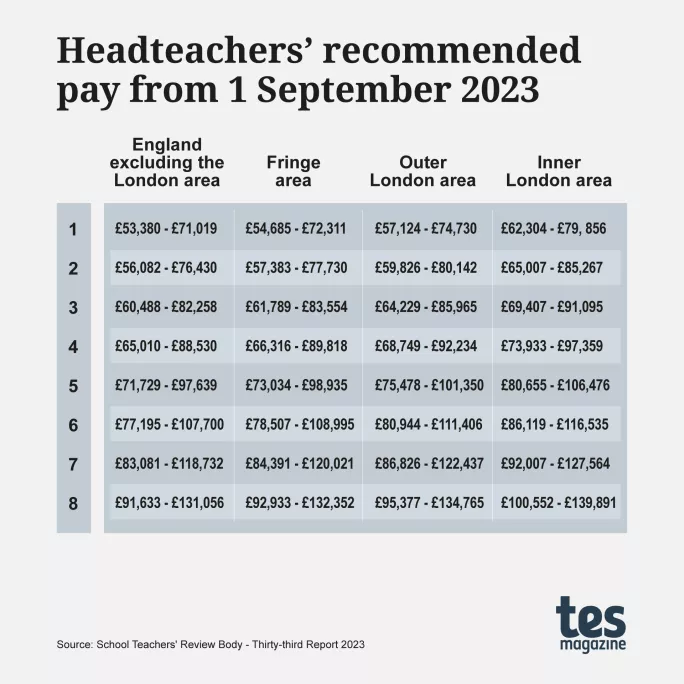
5. Will I automatically receive my new salary in September?
No, teachers will not see an automatic increase in their salary in their September pay.
Instead, when teachers return in the autumn, there will be individual performance management reviews and then the new salaries will have to be approved by school governors.
Once this has happened, the new salary will be used and teachers will receive backdated pay to September to cover the months when they were paid using the old pay scale.
Exact dates can vary between schools, so teachers should check with their HR department or line manager.
6. Will any teachers not receive an increase?
According to the School Teachers’ Pay and Conditions (STPCD) guidance, “schools and local authorities must abide by” the pay scales.
It also adds that “any party not following this guidance would need to have good reason not to do so and would need to be able to justify any departure from it”.
However, “non-maintained” schools - that is academies, independent schools, public schools and private schools - can set their own pay scales. Technically, this means staff in these settings may not receive a rise.
For independent schools, this is perhaps to be expected but for teachers in academies, things are less clear. However, it was noted in the School Teachers’ Review Body 2023 that although “some multi-academy trusts had moved to systems with a greater focus on staff development” for their appraisal and pay systems, on the whole, ”[t]he STPCD was still heavily used and valued by academies”.
As such, most staff should likely expect the equivalent pay rise, although it cannot be guaranteed as it can in a maintained school.
7. I am starting a new school in September, will I be paid the salary that I agreed to when I signed my contract or receive the rise too?
When you sign a teaching contract, your pay is attached to the pay scale point, not a figure. Therefore, when you take up the post, your salary will change according to the pay scale for that academic year.
For example, if you are a trainee teacher taking up your first teaching post in England (outside of the London weighting area) in September 2023, your contract will say M1 and possibly £28,000.
However, because the M1 salary is increasing by 7.1 per cent to £30,000, this is the amount you will be paid (once the pay approval process has been followed - as per question four).
8. How will the pay rise change my student loan repayment contributions?
Teachers who are repaying their student loans can expect the repayments to change according to the change in their salary.
The amount that this will change will vary depending on the type of loan taken and repayment plan.
A spokesperson from the Student Loans Company advised that teachers should check to see how their new salary will change their repayments.
The spokesperson explains: “Customers repay their student loan when their income goes over the threshold amount [ranging from £22,015 to £27,660] for their repayment plan type. Depending on the plan type, they will repay either 9 per cent or 6 per cent [postgraduate loan plan].”
There is more information on the Student Loans Company website.
9. How will the pay rise change my pension contributions?
Teachers who have opted into the Teachers’ Pension Scheme (TPS) may also see changes to their pension contribution payments when their pay increases.
Madeleine Dowling, technical manager at financial advisers Wesleyan, explains that repayment amounts vary according to salary and that there are “six salary bands”, which change every year in April, and advises teachers can “check their band using the TPS website”.
Although Dowling advises that not all teachers will see a change in their band due to the pay rise, she does say that they “expect those that will see the largest increases in pension payments to be those at the tops of band one - those earning approximately £32,000 - or band four, those earning approximately £67,900”.
She gives the example of a teacher who is paid M3 £31,750 and is currently on band one of the TPS repayments and therefore pays 7.4 per cent of their salary into their pension.
The autumn pay rise will move that teacher onto M4 £36,051 and consequently onto band two for the pension repayments and they will start paying 8.6 per cent of their salary into their pension.
Their pension contribution would go from £2,349.50 per annum (7.4 per cent) to £3,100.30 per annum (8.6 per cent).
This means that although their overall salary will increase, the pension repayments will take up a bigger proportion of their salary.
10. Will all schools be able to afford the new pay scales?
The issue of teacher pay rise affordability has been subject to much scrutiny over the last year, and the new pay announcement has led some school leaders to raise concerns that they won’t be able to afford these increases.
More detail can be found in our recent article on the teacher pay rise.
Register with Tes and you can read two free articles every month plus you'll have access to our range of award-winning newsletters.
Keep reading with our special offer!
You’ve reached your limit of free articles this month.
- Unlimited access to all Tes magazine content
- Save your favourite articles and gift them to your colleagues
- Exclusive subscriber-only stories
- Over 200,000 archived articles
- Unlimited access to all Tes magazine content
- Save your favourite articles and gift them to your colleagues
- Exclusive subscriber-only stories
- Over 200,000 archived articles
topics in this article



